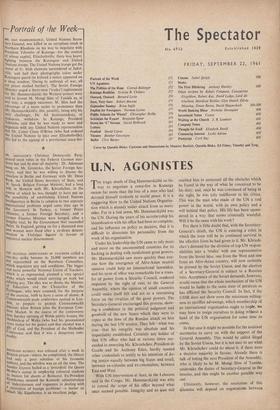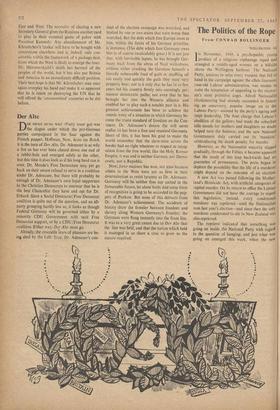U.N. AGONISTES
TI IL tragic death of Dag Hammarskjold on his way to negotiate a cease-fire in Katanga means far more than the loss of a man who had devoted himself tirelessly to world peace. It is a staggering blow to the United Nations Organisa- tion which is already under attack from so many sides. For in a real sense, Mr. Hammarskjold was the UN. During the years of his secretaryship his identification with his office had been so complete, and his influence on policy so decisive, that it is difficult to dissociate his personality from the work of his organisation.
Under his leadership the UN came to rely more and more on the uncommitteti countries for its backing in dealing with recalcitrant great powers. Mr. Hammarskjold saw more quickly than any- one how the emergence of Afro-Asian neutral opinion could help an international lawmaker, and his term of office was remarkable for a trans- fer of power from a Secuiity Council, rendered impotent by the right of veto, to the General Assembly, where the opinion of small countries could make itself felt and act as a restraining force on the rivalries of the great powers. The Secretary-General encouraged this process, show- ing a confidence in the political judgment and goodwill of the new States which they were to repay at the time of the Russian attack on him during the last UN session. They felt—what was true—that his integrity was absolute and his impartiality established. Certainly any holder of that UN office who had at various times suc- ceeded in annoying Mr. Khrushchev, President de Gaulle and Sir Anthony Eden, hardly needed other credential's to testify to his intention of do- ing justice equally between big States and small, between ex-colonies and ex-colonialists, between East and West.
With UN intervention at Suez, in the Lebanon and in the Congo, Mr. Hammarskjold was able to extend the scope of his office beyond what once seemed possible. Integrity and an iron will enabled him to surmount all the obstacles which he found in the way of what he conceived to be his duty; and, once he was convinced of being in the right, he was icily indifferent to his critics. This was the man who made of the UN a real power in the world, with its own policy and a will behind that policy. His life has been squan- dered in a way that seems criminally wasteful. Will it be the same with his work?
For there is little doubt that, with the Secretary- General's death, the UN is entering a crisis in which the, issue will be its continued survival in the effective form he had given to it. Mr. Khrush- chev's demand for the division of top UN respon- sibilities into a 'troika' with one representative from the Soviet bloc, one from the West and one from an Afro-Asian country, will now certainly be pressed by the Soviet Union, and the election of a Secretary-General is subject to a Russian veto. Acceptance of the Soviet demands, however, would mean that the whole mechanism of the UN would be liable to the same state of paralysis as has afflicted the Security Council. In fact, if the USSR does not show even the minimum willing- ness to sacrifice advantage, which membership of an international organisation ought to imply, we may have to resign ourselves to 4oing without a head of the UN organisation for some time to come.
In that case it might be possible for the assistant secretaries to carry on with the support of the General Assembly. This would be called illegal by the Soviet Union, but it is not easy to see what Mr. Khrushchev could do about it, if there were a decisive majority in favour. Already there is talk of letting the next President of the Assembly, who is likely to be M. Mongi Slim of Tunisia, undertake the duties of Secretary-General in the interim, and this might be another possible way. out.
Ultimately, however, the resolution of this dilemma will depend on negotiations between East and West. The necessity of electing a new Secretary-General gives the Russians another card to play in their eventual game of poker with President Kennedy. Any abandonment of Mr. Khrushchev's `troika' will have to be bought with concessions elsewhere and is, indeed, only con- ceivable within the framework of a package deal, from which the West is likely to emerge the loser. Mr. HammarskjOld's death has harmed all the peoples of the world, but it has also put Britain and America in an immediately difficult position. Their best hope is that Mr. Khrushchev may once again overplay his hand and make it so apparent that he is intent on destroying the UN that he will offend the 'uncommitted' countries as he did before.











































 Previous page
Previous page